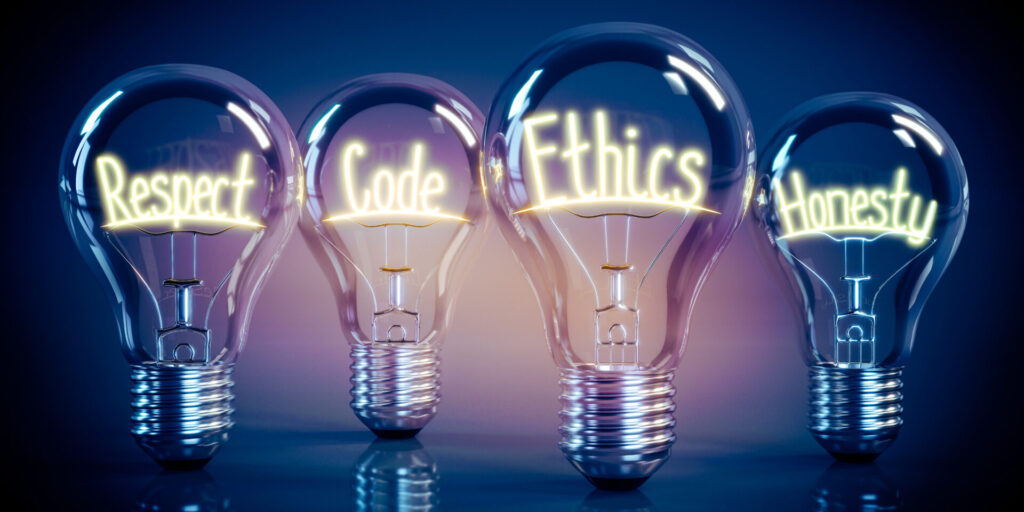Introduction:
Welcome back to the blog series by 308 Consulting & Strategy Group Inc.! I’m Blaine Lucas, the President & CEO, and in today’s post, we’ll delve into a fundamental aspect of a thriving work environment: ethical conduct. Ethical behavior is crucial for building trust, fostering positive relationships, and driving success within organizations. Join me as we explore the significance of ethical conduct in the workplace and the positive impact it has on individuals and the overall business.
Section 1: Building Trust and Reputation
1.1 Trust as the Foundation:
Ethical conduct establishes a foundation of trust between employees, teams, and leadership. When individuals know they can rely on each other to act with integrity, collaboration and productivity thrive. Trust also extends to external stakeholders, such as clients, customers, and partners, fostering stronger relationships and enhancing the organization’s reputation.
1.2 Enhanced Organizational Reputation:
Ethical behavior contributes to a positive organizational reputation, attracting top talent, clients, and investors who prioritize ethical business practices. A strong reputation built on ethical conduct can lead to increased loyalty from customers and stakeholders, positively impacting the organization’s bottom line.
Section 2: Maintaining a Positive Work Environment
2.1 Ethical Leadership:
Leaders play a crucial role in setting the ethical tone within the organization. By demonstrating ethical behavior, leaders inspire employees to uphold high standards of conduct. Ethical leaders foster a culture of transparency, fairness, and accountability, promoting employee engagement, satisfaction, and well-being.
2.2 Respectful and Inclusive Workplace:
Ethical conduct includes treating all individuals with respect and dignity, regardless of their background, characteristics, or position. Embracing diversity and fostering inclusivity creates a harmonious work environment where everyone feels valued, leading to higher levels of collaboration and innovation.
Section 3: Compliance and Risk Management
3.1 Legal and Regulatory Compliance:
Ethical conduct aligns with legal and regulatory frameworks, ensuring the organization operates within the boundaries of the law. Compliance with laws and regulations reduces the risk of legal issues, penalties, and damage to the organization’s reputation.
3.2 Risk Mitigation:
Ethical behavior minimizes risks associated with fraud, misconduct, and conflicts of interest, safeguarding the organization’s financial stability, and preserving stakeholder trust. Effective risk management strategies involve proactive measures, such as implementing ethical policies, conducting regular audits, and promoting ethical awareness among employees.
Conclusion:
Ethical conduct is the cornerstone of a successful and sustainable work environment. By building trust, maintaining a positive work culture, and ensuring compliance and risk mitigation, organizations can thrive and create a lasting impact. Let us all commit to upholding ethical behavior and promoting a workplace where integrity, respect, and fairness prevail.
Stay tuned for the next blog post, where we’ll explore strategies for promoting work-life balance and employee well-being.
References:
- Brown, M. E., Treviño, L. K., & Harrison, D. A. (2005). Ethical leadership: A social learning perspective for construct development and testing.
- Treviño, L. K., & Nelson, K. A. (2021). Managing business ethics: Straight talk about how to do it right.
- Kalshoven, K., Den Hartog, D. N., & De Hoogh, A. H. (2011). Ethical leadership at work questionnaire (ELW): Development and validation of a multidimensional measure.
- Chatman, J. A., & O’Reilly, C. A. (2004). Asymmetric reactions to workgroup sex diversity among men and women.
- Ferrell, O. C., Fraedrich, J., & Ferrell, L. (2021). Business ethics: Ethical decision making and cases.
- Ponemon Institute. (2021). The state of ethics in the workplace.




